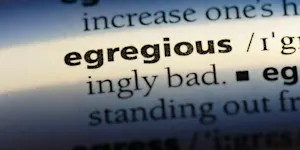What Makes This Word Tick
"Mammonism" is not your everyday dinner-table conversation starter. This word is all about the almighty dollar—or rather, an excessive focus on wealth. It's derived from "Mammon," a term used to personify wealth or material greed. If you've ever shaken your head at the materialism of society, you've touched on the core of mammonism.
If Mammonism Were a Person…
Picture Mammonism as a well-dressed individual with a penchant for luxury cars, extravagant jewelry, and a suspiciously large bank account. They're someone who measures success by net worth and can tell you the price of an item faster than its value.
How This Word Has Changed Over Time
Originally rooted in biblical texts, "Mammon" was more of an abstract concept representing wealth as a false god. Over time, "mammonism" has evolved into a word that captures a cultural critique of capitalistic excess and material greed. It suggests a moral or ethical judgment about prioritizing wealth over more spiritual or altruistic pursuits.
Old Sayings and Proverbs That Use Mammonism
While there are no direct old sayings with "mammonism," the biblical warning "You cannot serve both God and Mammon" captures the essence. It's a timeless reminder that love of money often competes with spiritual or moral values.
Surprising Facts About Mammonism
Did you know that "Mammon" is not just biblical but appears in various cultural texts, including John Milton's "Paradise Lost," where Mammon is depicted as a fallen angel? This connection underscores the enduring association of wealth with moral decline across literature.
Out and About With This Word
You might encounter "mammonism" in a fiery op-ed discussing societal values or in an academic paper analyzing the effects of capitalism. It's a word primed for debates about economics, ethics, or even the pros and cons of modern consumerism.
Pop Culture Moments Where Mammonism Was Used
Though not a blockbuster buzzword, the idea of mammonism pops up in films or TV shows that critique wealth, like "The Wolf of Wall Street" or classic novels such as "The Great Gatsby." They offer a glimpse into what happens when people let money rule their worlds.
The Word in Literature
In literature, "mammonism" might find a comfortable home in both classic works decrying the excesses of the Industrial Age or modern critiques of consumer culture. Think Charles Dickens or Thomas Piketty, both shining a light on wealth's impact on society.
Moments in History with Mammonism
The Gilded Age in the United States and the Roaring Twenties are periods that could easily be described as high on mammonism. These were times when consumer culture and wealth defined social status, creating stark contrasts between the rich and poor.
This Word Around the World
In different languages and cultures, the concept of mammonism might be described variably. For example, in Japanese, "materialism" can be referred to as "busshitsu shugi," highlighting similar values of prioritizing material wealth over other life aspects.
Where Does It Come From?
"Mammonism" roots in the biblical "Mammon," often seen as a demon of excess. Originally used as a caution against idolizing wealth, it has taken on broader meanings encompassing greed and materialism.
How People Misuse This Word
Some might toss around "mammonism" to criticize any form of financial aspiration. However, true mammonism implies an extreme, greedy obsession with wealth, not just ambition or financial success on its own.
Words It’s Often Confused With
Materialism: While similar, this often refers more broadly to valuing physical possessions over the spiritual.
Consumerism: Focused on the acquisition of goods, but not necessarily with the same moral judgment.
Greed: A close cousin, but mammonism specifically ties to wealth as a false idol.
Additional Synonyms and Antonyms
Synonyms include greed, materialism, and avarice. Antonyms might be altruism, spirituality, or philanthropy—concepts rich in community and moral undertones.
Want to Try It Out in a Sentence?
"His relentless pursuit of wealth, with little regard for the wellbeing of those around him, seemed like a textbook case of mammonism."
















